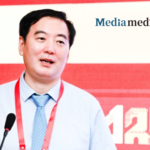
Editor's Note: From August 2-4, 2024, the 7th Oncology Precision Diagnosis and Treatment Conference and the 10th Breast Cancer Individualized Treatment Conference (COMB), organized by the China Cancer Foundation and Beijing Breast Disease Prevention Society, was grandly held in Beijing. The conference brought together the latest advances in individualized precision treatment for breast cancer in China, providing a broad platform for promoting new concepts, developing new technologies, and creating new models in the breast cancer field. With the recent advancements in breast cancer precision medicine, CDK4/6 inhibitors (CDK4/6i), immunotherapy drugs, and antibody-drug conjugates (ADCs) have significantly improved the survival benefits for breast cancer patients. Oncology Frontier conducted an exclusive interview with Dr. Songqing Ye from Fujian Provincial Hospital to discuss the current landscape and trends in the development of new drugs for precision treatment of early-stage breast cancer.Oncology Frontier: Genetic testing plays a crucial role in evaluating the recurrence risk and treatment of hormone receptor-positive early-stage breast cancer (HR+ eBC). Could you share the research progress in this area and the challenges faced in the practice of genetic testing in China?
Dr. Songqing Ye: Currently, the application of genetic testing in breast cancer treatment in China is becoming increasingly widespread, providing individualized precision treatment guidance for breast cancer patients. The Chinese Society of Clinical Oncology (CSCO) Breast Cancer Diagnosis and Treatment Guidelines (CSCO BC Guidelines) and the Chinese Anti-Cancer Association Breast Cancer Diagnosis and Treatment Guidelines and Standards (CBCS Guidelines) both recommend the clinical application of genetic testing, including the 21-gene test (Oncotype DX®), 70-gene test (MammaPrint®), 28-gene test (RecurIndex®), 12-gene test (EndoPredict®), and PAM50, among others.
Genetic testing can not only assess the recurrence risk of patients to guide subsequent treatment but also predict prognosis. In the NATALEE study, which included a broader population of stage II-III HR+/HER2- early-stage breast cancer patients, even clinically low-risk patients (e.g., stage IIa, T2N0) with high-risk Oncotype DX® results could consider enhanced adjuvant treatment with ribociclib. This illustrates that genetic testing is valuable not only in determining whether chemotherapy can be waived but also in optimizing strategies such as enhanced adjuvant treatment.
In the current clinical practice in China, there are some challenges and issues related to the application of genetic testing. For example, the testing standards and levels of standardization across various genetic testing centers and platforms differ, which is a concern. Additionally, whether the cost of genetic testing can be covered by insurance is another topic of discussion. While genetic testing is widely used abroad, its accessibility in China still needs improvement. For instance, the 21-gene test products available domestically are not original products, leading to insufficient accessibility.
Oncology Frontier: CDK4/6i therapy has achieved breakthroughs in HR+ eBC. In your clinical practice, how should we effectively manage adjuvant treatment with CDK4/6 inhibitors?
Dr. Songqing Ye: The application of CDK4/6 inhibitors (CDK4/6i) in breast cancer has progressed from advanced stages to early stages. Palbociclib, abemaciclib, ribociclib, and the domestic dalpiciclib have all conducted clinical studies in the adjuvant treatment of HR+/HER2- early-stage breast cancer. Among these, the monarchE and NATALEE studies have yielded positive results in adjuvant treatment. Based on these findings, the CSCO BC Guidelines and other guidelines recommend the use of abemaciclib combined with aromatase inhibitors (AI) for patients with four or more positive lymph nodes, or 1-3 positive nodes with additional risk factors. Ribociclib, in the NATALEE study, included a broader population, encompassing both lymph node-positive patients and some high-risk lymph node-negative patients, and also achieved positive results. The key now is identifying the population that can truly benefit more from CDK4/6i treatment. Whether there are biomarkers that can guide the more precise application of CDK4/6i is an area that requires further exploration.
Regarding treatment duration, abemaciclib is administered for two years, while ribociclib is given for three years. Because the NATALEE study included a lower-risk population than the monarchE study, with a potentially later peak of recurrence, a longer duration of CDK4/6i treatment may better cover the potential recurrence population, making it easier to achieve positive results in relatively low-risk patients. Additionally, longer CDK4/6i treatment may exert a more prolonged inhibition on tumor cells, leading to irreversible senescence and better anti-tumor effects.
In addition to patient selection and treatment duration, managing the side effects of CDK4/6i is also crucial. For instance, diarrhea with abemaciclib and cardiac toxicity and hepatotoxicity with ribociclib require special attention. Moreover, patient education is an essential aspect of managing side effects.
Oncology Frontier: Immunotherapy is gradually emerging in HR+ eBC. What do you see as the future prospects of its application in this area?
Dr. Songqing Ye: Immunotherapy has already entered the realm of breast cancer treatment. In early triple-negative breast cancer (TNBC), the KEYNOTE-522 study demonstrated dual positive results, showing improvements in pathological complete response (pCR) and event-free survival (EFS) with neoadjuvant immunotherapy, establishing it as the new standard neoadjuvant treatment for TNBC. Immunotherapy research has also been conducted in HR+ breast cancer. The KEYNOTE-756 and CheckMate 7FL studies, reported last year, showed promising preliminary data for immunotherapy in patients with histological grade 3, lower hormone receptor expression, and PD-L1 positivity, with significant improvements in pCR, bringing new hope for neoadjuvant treatment in HR+ early breast cancer.
In the adjuvant treatment field, since the tumor has already been removed, the number and variety of immune cells such as T cells activated by immunotherapy are significantly reduced, which may affect its efficacy. In TNBC, if neoadjuvant immunotherapy was not administered, there is currently limited evidence for the effectiveness of adjuvant immunotherapy alone. The IMpassion030 study presented at the 2023 San Antonio Breast Cancer Symposium (SABCS) showed no improvement in invasive disease-free survival (iDFS) with adjuvant chemotherapy plus atezolizumab. Although the A-BRAVE study reported at this year’s American Society of Clinical Oncology (ASCO) Annual Meeting showed an overall survival (OS) benefit with adjuvant immunotherapy in high-risk recurrent TNBC, it did not achieve a positive result for its primary endpoint of disease-free survival (DFS). The ongoing SWOG S1418/NRG BR006 phase III trial is a larger study (n=1000) comparing single-agent pembrolizumab in TNBC. Professor Shao Zhimin’s team from Fudan University has conducted a molecular reclassification study of HR+/HER2- breast cancer, revealing that approximately one-quarter of the patients belong to the immunogenic subtype (SNF2), who may benefit from immunotherapy. Therefore, we look forward to more future research on immunotherapy, which may provide more evidence-based medicine for neoadjuvant and adjuvant treatment in HR+/HER2- breast cancer.
Oncology Frontier: In recent years, ADC drugs have shone brightly in the treatment of advanced breast cancer. What do you think about the application prospects of ADCs in early-stage breast cancer?
Dr. Songqing Ye: In advanced breast cancer, antibody-drug conjugates (ADCs) have achieved excellent results in HER2-positive, triple-negative breast cancer (TNBC), and HR+ breast cancer, revolutionizing the treatment landscape. ADCs are now undergoing a series of studies, gradually moving from late-line to frontline, and from advanced to early-stage treatment.
For HER2-positive breast cancer, the previous KATHERINE study demonstrated that trastuzumab emtansine (T-DM1) could be used as an enhanced adjuvant therapy for non-pCR patients. The ongoing DESTINY-Breast05 study is also exploring the head-to-head comparison of trastuzumab deruxtecan (T-DXd) versus T-DM1 in HER2-positive non-pCR patients. The DESTINY-Breast11 study is challenging the standard trastuzumab plus pertuzumab dual-target combined chemotherapy regimen in the neoadjuvant treatment field by using T-DXd monotherapy or combination therapy, and we eagerly await the presentation of relevant data.
In the field of TNBC, a series of ADC drug studies have also made significant progress. The NeoSTAR study used the TROP-2 ADC sacituzumab govitecan (SG) as monotherapy or in combination with immunotherapy for neoadjuvant treatment in TNBC, with a pCR rate of 30% for SG monotherapy, and up to 70% in the BRCA-mutated population. In the neoadjuvant treatment of non-pCR TNBC patients, the CREATE-X study established capecitabine as the standard enhanced adjuvant therapy. The SASCIA study is challenging the enhanced adjuvant therapy status of capecitabine in HER2-negative non-pCR patients using SG. In the field of ADC combined with immunotherapy, the ASCENT05 study is exploring the combination of SG with pembrolizumab versus pembrolizumab ± capecitabine in adjuvant treatment of TNBC. The I-SPY 2.2 study reported at the 2024 ASCO Annual Meeting also showed a significant improvement in pCR with Dato-DXd combined with durvalumab in the neoadjuvant treatment of some TNBC and HR+ breast cancer patients.
For HR+ breast cancer, besides Dato-DXd in I-SPY 2.2, the TALENT study showed a good objective response rate (ORR) with T-DXd monotherapy or in combination with letrozole in the neoadjuvant treatment of HR+/HER2-low patients.
In summary, ADCs are not only shining in the treatment of advanced breast cancer but are also achieving promising preliminary results in early-stage breast cancer, and we are eagerly anticipating more and better outcomes from ADCs in the early-stage treatment of breast cancer.
Dr. Songqing Ye
Chief Physician, Department of Breast Surgery, Fujian Provincial Hospital Deputy Director of Administration, responsible for daily work Member of the Breast Cancer Committee, Chinese Anti-Cancer Association Member of the Breast Cancer Expert Committee, Chinese Society of Clinical Oncology (CSCO) Member of the Breast Cancer Group, Oncology Doctor Branch, Chinese Medical Doctor Association Deputy Director, Yangtze Academic Breast Alliance Deputy Director, Breast Disease Branch, Fujian Medical Association Editorial Board Member, Gland Surgery; Specially Invited Editorial Board Member, Chinese Journal of Breast Disease


